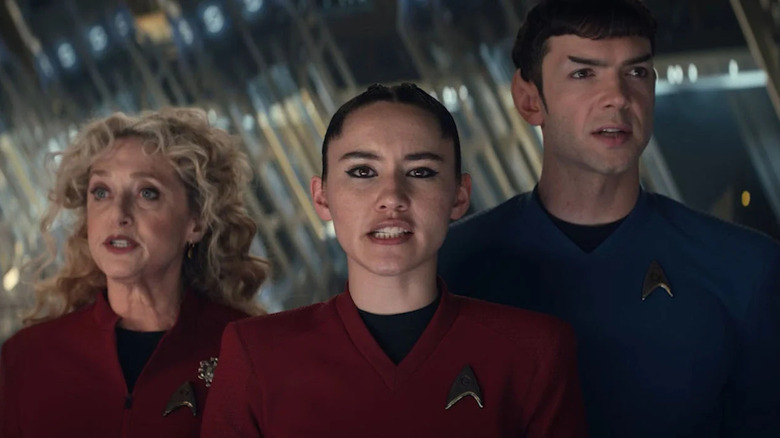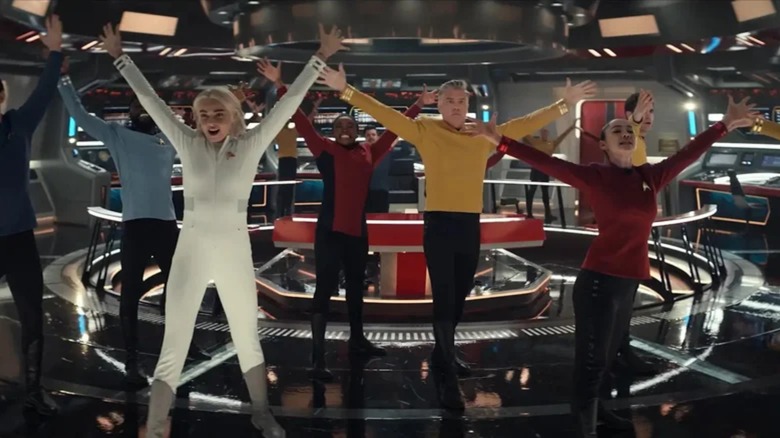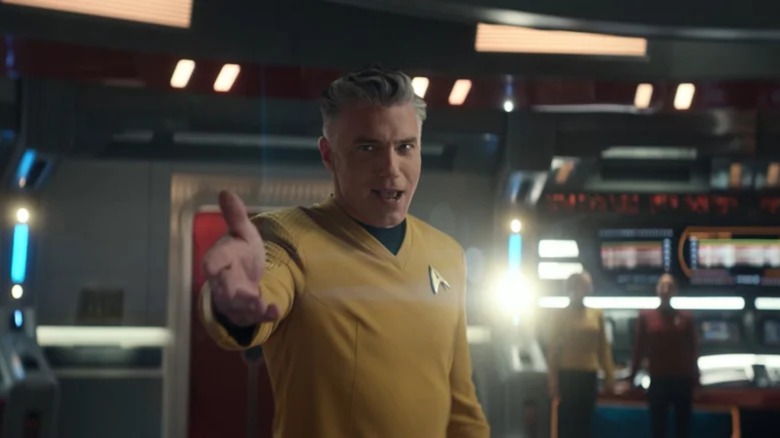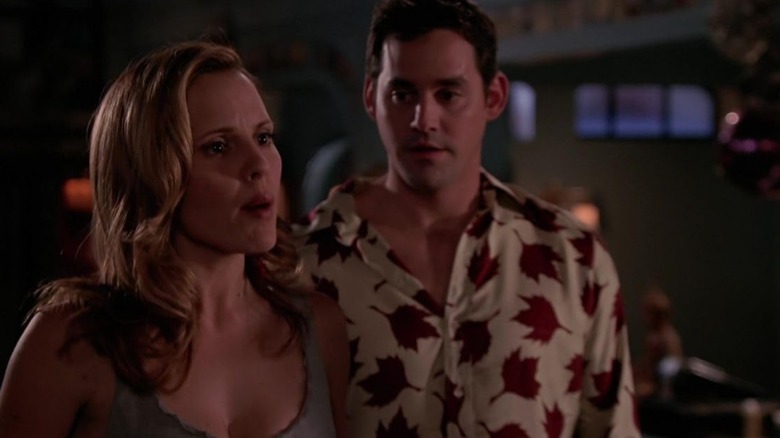Star Trek: Strange New Worlds Understands What Made Buffy's Musical Episode So Special
This post contains spoilers for the latest episode of "Star Trek: Strange New Worlds."
22 years ago, "Buffy the Vampire Slayer" made the musical episode blueprint. Before and since then, announcements about one-off episodes of much-loved series set in musical reality have elicited eye rolls, but "Buffy" got it pretty perfect. With "Once More, With Feeling," the show not only delivered extremely catchy tunes, but also genuine emotion; instead of making its plot superfluous, episode writer and series creator Joss Whedon decided to do the exact opposite. This hour was a chance for big moments to unfold and revelations to come to light — breakups, fights, guilty admissions, and even swooning, old Hollywood-style kisses all play out via song. If you skipped the "Buffy" musical episode, you would have no idea what was going on the next week.
"Subspace Rhapsody," the ambitious and largely rewarding "Star Trek: Strange New Worlds" episode that doubles as a musical (fulfilling a dream "Star Trek" writers have had for decades), clearly follows the "Buffy" blueprint. Like "Buffy," its characters begin singing due to a simple mistake; in that show, Xander makes a charmed wish for a musical happy ending, while in "Star Trek," Uhura creates an unstable new reality by sending a song into a powerful subspace fold. More importantly, just as the Scoobies sung their hearts out and accidentally revealed their truths in the process, the Enterprise crew finds themselves obeying musical reality — i.e. being awkwardly honest whenever they open up their mouths.
The best musical episodes are unskippable
In "Star Trek: Strange New Worlds," that honesty leads to some bumpy relationship moments, but it also gets a lot more serious. "When people sing they are confessing highly personal, emotional information," La'an (Christina Chong) laments to Captain Pike (Anson Mount), jaw clenched. She deems the musical problem a security risk, not just because it would be embarrassing for her to tell James Kirk (Paul Wesley) that she started to fall for him in another time and place, but because she's been forbidden from talking about time travel shenanigans in general. "Buffy" has a similarly serious (yet silly) threat underlying its musical episode — the demon Sweet, who wants everyone to basically dance until they die.
"Subspace Rhapsody" works better than most musical episodes of the 21st century in part because it follows the "Buffy" blueprint, raising the stakes and making the emotional truth of the episode narratively essential. Basically, rather than throwing together some fun but meaningless numbers, it makes itself unskippable. It's through this episode that we learn that Kirk is already having a kid with Carol, that Chapel (Jess Bush) got accepted into a special fellowship program, that La'an has trouble being vulnerable, and that Uhura (Celia Rose Gooding) feels connected to her family when she works.
In Star Trek, characters are just as passionate about their work as their relationships
Uhura's song actually exemplifies one of the biggest differences between "Once More, With Feeling" and Trek's latest episode: while the former features a whole host of relationship drama, the latter smartly ties its characters' emotions back to their job roles, ambitions, and place aboard the Enterprise. The episode feels true to the franchise because everyone isn't just singing about how they're sad or wistful — they're also singing about their non-romantic hopes and dreams. Nurse Chapel's song, "I'm Ready," is one of my favorites because it has a gloriously celebratory feeling to it. Spock (Ethan Peck) asks why she didn't tell him about her acceptance message, and she responds by explaining that, honestly, she's too excited about it to consider any alternative besides leaving him behind. The song doesn't end on that bittersweet note, but with her joy.
"Star Trek" has always been a brainy franchise that's as passionate about team bonding and planetary exploration as it is about the inter-crew romances that inevitably pop up. It feels right that when the franchise finally pulls off a musical episode, it's one that features songs in which Una (Rebecca Romijn) teaches Kirk to be a better first officer, Chapel celebrates a career milestone, and the best song in the episode — the excellent ensemble piece "Status Report" — is all about the state of the Enterprise. "Subspace Rhapsody" brings it all home with a climax that sees Uhura encouraging the whole crew to sing, which, somehow, is the only way to get everything back to normal.
Subspace Rhapsody sneaks in a clear Buffy reference
"Subspace Rhapsody," which is written by Dana Horgan and Bill Wolkoff, also understands the musical episode formula better than nearly any other show that's tried to walk in the footsteps of "Once More, With Feeling." With a stellar, meta "Community" Christmas episode as the rare exception, most post-"Buffy" musicals have felt forced — either musically or lyrically sub-par or full of manufactured drama that doesn't connect well to the rest of the series (does anyone remember why Dr. House sung "Get Happy"? I sure don't). "Subspace Rhapsody," on the other hand, clearly draws from "Buffy" in its narrative and structure, even going so far as to include a throwaway line about bunnies. Its musical predecessor very pointedly featured a silly aside in which the demon Anya was certain bunnies were behind the musical reality — a random hypothesis that pops up just after the first big musical number dies down, just like the bunnies reference in "Strange New Worlds" does.
This is a pretty clear homage, but anyone who says "Subspace Rhapsody" is a "Once More, With Feeling Clone" is wrong. The episode features fewer catchy songs than "Buffy" (nothing in the climax quite matches up to "Walk Through the Fire" or "Where Do We Go From Here?"), but the cast is also more musically cohesive, and, surprisingly, everyone seems to be a good singer. More importantly, though, "Star Trek: Strange New Worlds" sees the path "Buffy" charted and takes it one step further, using its musical reality not just to convey romantic truths about its characters, but also delightfully geeky ones, too. This may be the first time this beloved sci-fi franchise has ever attempted a full-scale musical, but make no mistake — it's classic "Star Trek."



